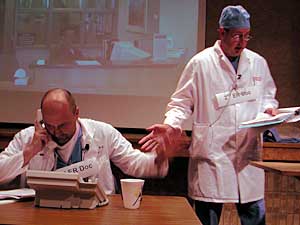|
Audio
Photos
More from MPR
Resources
Your Voice
|
'Smallpox: A Musical'
November 10, 2003
 |
| An emergency room scene from "Smallpox: A Musical," performed by staff at St. Cloud Hospital. (MPR Photo/Annie Baxter) |
St. Cloud, Minn. — Here's the way doctors in St. Cloud imagine a smallpox outbreak. Panicked hospital employees scurry about in a blaze of blue scrubs. A doctor dons a biohazard suit and sprays bleach everywhere. The beleaguered workers wring their hands and then belt into song, to an oddly familiar tune.
"Smallpox, smallpox, what a challenge for our docs," they sing to the tune of "Charleston."
It's a performance of Smallpox: A Musical. Covers of hit musical tunes are cleverly revised to tell the story of mucus -- that nefarious transmitter of smallpox.
Suddenly, the familiar sounds of music are back.
 | |||
"The halls are awash, with the sound of mucus. And everyday ills, are now shown the door. 'Cause deep in our hearts, what has so confused us, is fevers and pustules and festering sores," sing hospital workers to the melody of "The Sound of Music."
The musical is the brainchild of Dr. Daniel Whitlock, vice president of medical affairs at St. Cloud Hospital. But these days, in addition to his administrative role, Whitlock is busy making casting calls. His eyes twinkle as he runs a hand through his silver hair.
"I thought you'd be a good one," he says to a perspective recruit, "because you have stage presence. And you're dynamic."
This is a change of pace for Whitlock. Just over a month ago, his staff had to care for two school shooting victims. The emergency showed how communication is critical in a crisis situation. The play they're putting on now is whimsical, but its message is serious. After Sept. 11, 2001, the federal government pushed hard for hospitals to step up their bioterrorism preparedness. St. Cloud Hospital was chosen to lead the region in its efforts. That meant assessing pharmacological stockpiles and isolation rooms, updating equipment, and coordinating with federal agencies.
A year and a half later, Whitlock says he and his colleagues had to figure out how to convey their findings to hospital staff.
 | |||
"And I'll be the first to admit, we were probably a little bit squirrelly after spending this concerted amount of time studying some very, very boring topics," he says.
Whitlock dreaded another talking-head lecture about smallpox. Then came a "eureka" moment.
"Somebody said, 'Why don't we put on a play?'" Whitlock recalls. "And then somebody said, 'Why don't we make it a musical?' And somebody said, 'I can see it now: 'Smallpox: A Musical.'"
This might not be how people at the Centers for Disease Control and Prevention would approach the topic. But the organization does actively advocate for education about smallpox. Von Roebuck, CDC spokesman, says there's no known threat of smallpox currently. Nevertheless, it's still a high priority.
"We feel the potential being strong enough to definitely put that as a major component for the terrorism preparedness grants program that we're doing in various states right now," Roebuck says.
 | |||
Smallpox isn't the singular priority of St. Cloud Hospital. But it's a useful tool for talking about bioterrorism more broadly. The mere identification of an infectious disease can be a public relations nightmare. In fact, that problem is the central conflict in the play.
"Do we want to be the hospital that pulls the false alarm?" one of the cast asks. "I can see the headlines in the New York Times. 'Hospital of fools. Midwest bumpkins pull the false alarm!'"
This is the third performance of the play. The hospital will tape the show and distribute copies to other hospitals.
Audience member Dr. John Dennis says he's all for this new pedagogical model.
"It's an extraordinary way of getting through something difficult," Dennis says. "It's laughable, but in the end, people would have an idea of what to do."
Next week, the cast of Smallpox: A Musical takes its show to a national conference in Washington, D.C.
|
News Headlines
|
Related Subjects
|
